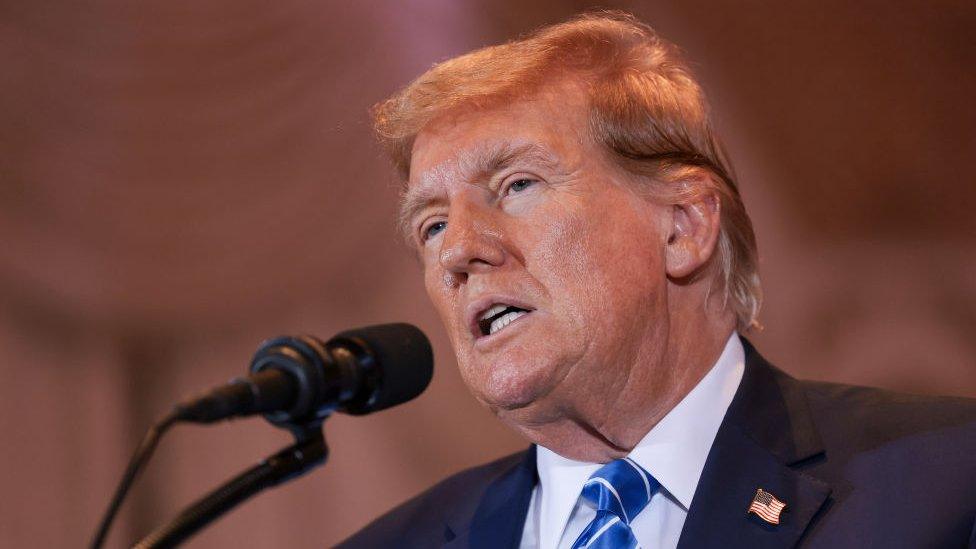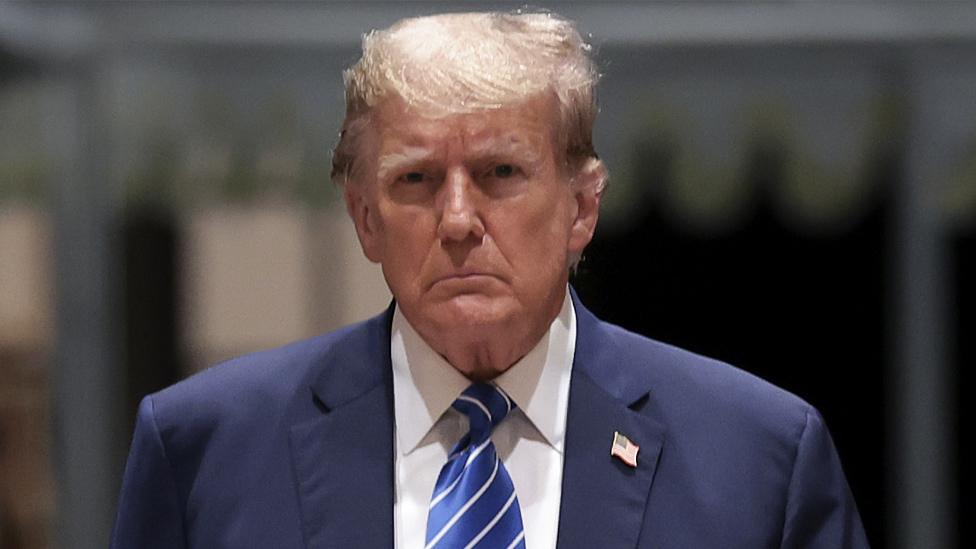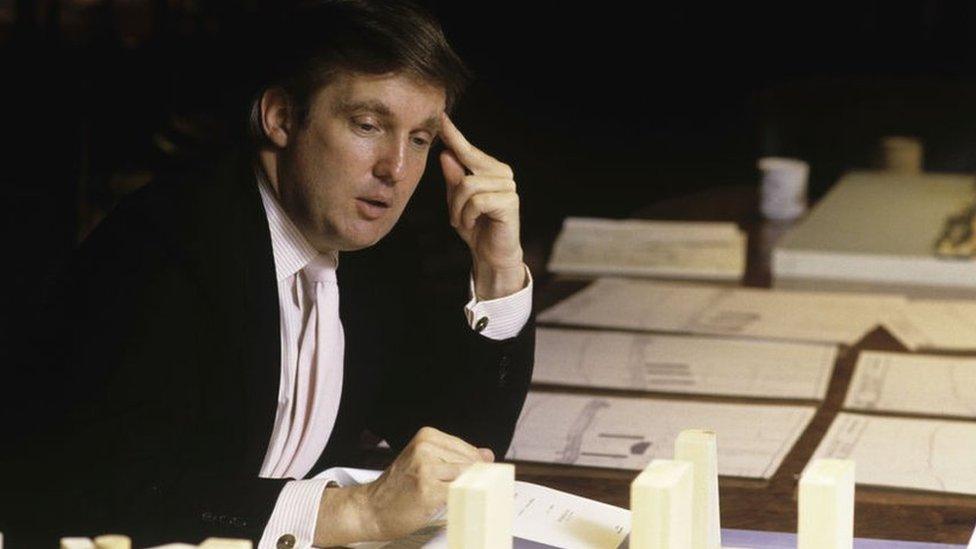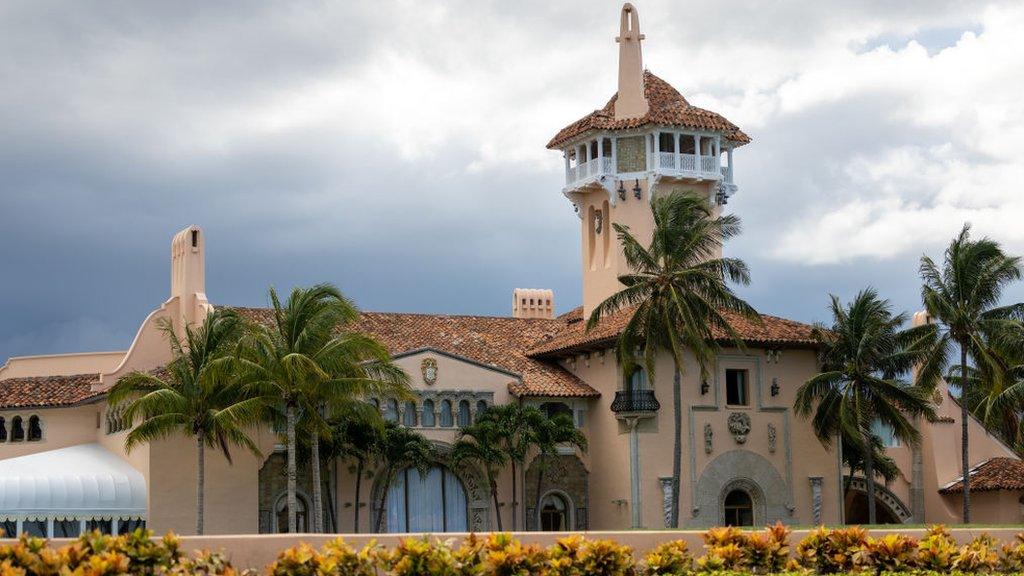Trump needs a $464m bond in three days. What if he can't get it?
- Published

The former president must pay the full amount in cash or secure a bond by 25 March
Donald Trump's lawyers are asking a New York court to put a $464m (£365m) fine in a civil fraud case on hold, as the former president finds himself in a precarious financial situation that could ultimately see his most prized properties taken.
If Mr Trump wants to continue his appeal in the case without the state seizing the fine from him, he must submit the full amount in cash or secure a bond from a private company by 25 March.
On Monday, his lawyers said that despite their "diligent efforts" it had been "practically impossible" to find a company willing to act as a guarantor of the full sum and asked for a pause.
"We really are in a moment of serious crisis for Trump personally, as well as for his business," said Professor Will Thomas from the University of Michigan Ross Business School.
Just days later, however, Mr Trump said on his social media site Truth Social that he had secured more than $500m in cash that could be used as collateral for a bond.
With the clock seemingly ticking, here's what could happen next in the case.
1) Trump secures a bond
A panel of appeals court judges will decide by 25 March whether the $464m judgement can be paused while Mr Trump appeals.
In filings earlier this week, Mr Trump's lawyers said they had approached 30 bond companies without success, due to the "massive" size of the judgement.
To secure a bond, an individual must demonstrate to the company providing the guarantee that they have enough liquidity - usually in the form of cash plus stocks or securities which can be sold quickly - to cover the amount.
The bonding company would agree to pay the financial penalty if Mr Trump loses his appeal and cannot do so himself.
In a Truth Social post on Friday, Mr Trump said he had secured nearly enough funds for collateral. Companies require slightly more than the judgement itself to put up a bond.
"Through hard work, talent, and luck, I currently have almost five hundred million dollars in cash," Mr Trump wrote, adding that he had hoped to use the money for his presidential campaign.
The former president testified last year that he had around $400m in liquid assets. He could have sold other assets or taken a personal loan to reach half a billion.
Previously, New York Attorney General Letitia James said his claims about not being able secure a bond were "unreliable", arguing he could always get several smaller bonds.
2) Trump pays the penalty
Mr Trump could also use the $500m in cash he says he has to pay the judgement himself.
But he is much more likely to use as it as collateral, which is generally more cost-effective than paying the judgement outright, Mr Thomas said.
Mr Trump is seeking to overturn the judge's finding that he owes millions in potential lost interest by the banks that loaned him money, and from the profits of his sale of his New York golf course and Washington DC hotel.
Some have suggested another source of funds for the fine or the bond: Trump Media, the company behind the Truth social media platform.
It is poised to become a publicly listed company and trade in the stock market. Mr Trump's stake is expected to be worth $3 bn.
But that avenue is almost entirely closed to him. He will be barred for six months from selling his stock and would need a waiver to use his shares as collateral, which is a difficult hurdle to clear.
3) The option he may want to avoid: Bankruptcy
He could also declare bankruptcy, which would allow him to avoid paying the judgement.
While many analysts have said this is the cleanest way out of a financial mess, it is the path he will be least inclined to take.
Bankruptcy could be costly. It is also a very public process that could damage Mr Trump's reputation as a financial titan in an election year.
"Practically, it's the most devastating thing that Donald Trump could ever do to his self image," Mr Thomas said.
Mr Trump has filed for bankruptcy for his businesses multiple times in the past, but never for himself.
4) Trump gets a pause
An appeals court could side with the former president and allow him to hold off paying the judgement or posting bond while he appeals.
This would be a best-case scenario for the former president, who is no doubt eager to avoid having to pay an estimated 16% of what Forbes reports is his $2.6bn net worth.
However, an appeals court is less likely to grant Mr Trump this relief now that he has admitted to having the cash necessary to secure a bond, experts said.
Renato Mariotti, a lawyer who represents large real-estate developers, said it was hard to predict how the court would treat a former president.
"But my clients wouldn't get a pause," he said.
5) A compromise option
The court still could come back to Mr Trump with a middle-of-the-road option, experts said, requiring Mr Trump to post a bond of a smaller amount while he appeals against the ruling.
Mr Trump, however, has already asked an appeals court to allow him to post a bond covering $100m instead and was turned down.
Ultimately, if Mr Trump does not get a pause and the court offers no compromise option, he could appeal directly to New York's Court of Appeals.
But with a deadline of 25 March to pay the judgement or post a bond, he is working on a tight timeline and is seeing thousands of dollars in interest added to the penalty sum each day.
6) New York takes Trump's assets
If Mr Trump cannot find a way to pay the fraud judgement or secure a bond by 25 March, Ms James can begin to take his assets.
She is preparing to do so.
Recently, Ms James filed the fraud judgement with clerks in Westchester County, an indication she might try to take property in New York City's northern suburbs, where Mr Trump owns Seven Springs, a golf course and 212-acre estate.
Experts say this is another worst case scenario for Mr Trump, as he could lose some of his most famous properties.
They can take any of his buildings - not just those in New York - including the 58-floor Trump Tower and his sprawling Florida club, Mar-a-Lago, his most valuable asset, according to Forbes. The outlet said it was worth $292m in September 2023.
Ms James would likely not sell any assets until the appeals process is over, Mr Thomas said, because her office would have to pay Mr Trump back if he wins.
But if Ms James does eventually sell them, there would be a court-ordered process to do so, with the first $464m going to New York state to pay the judgement, and any money left over going to Mr Trump, said Mitchell Epner, an attorney who handles commercial litigation.
Mr Epner said the state could seize multiple assets, as none of Mr Trump's properties on their own appear to be worth $464m.
With additional reporting from Nada Tawfik
Related topics
- Published19 March 2024

- Published17 February 2024

- Published22 September 2022
